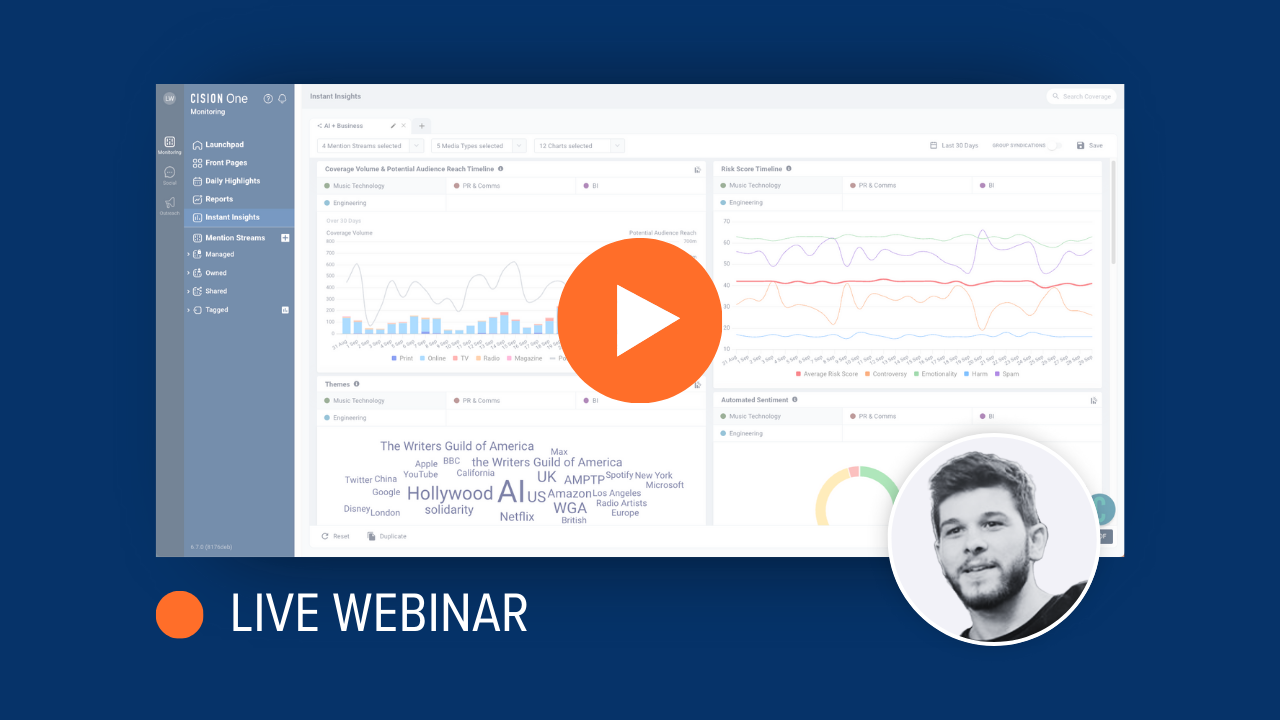Whether a career aptitude test steered you in this direction, watching “The Devil Wears Prada” made you want to step into Andy’s shoes (this movie reveals more about public relations than you might think), or you are looking to change professions, you’re probably reading this because you’re considering joining the PR and comms industry. But is it right for you? And which skills do you need to achieve PR success?
If television and movies are your only frame of reference for what working in public relations is like, you might be surprised to learn that PR is so much more than press releases and media launches; it involves communications strategies that shape how brands share their messaging with the world. Add to that social media’s ever-expanding reach (which, due to its power, could be both an opportunity for brand awareness or the mise-en-scène of a full-blown PR crisis) and the rise of generative AI tools that change the way teams work.
The role of PR and communications professionals is also more complex than meets the eye – it's an amalgamation of storytelling, relationship building, crisis management, PR measurement, and even more, depending on your brand’s needs. In this article, we’ll explore the pros and cons of choosing a career in PR, as well as essential PR skills for success in this role.
Pros of Choosing a Career in PR
If you’re considering starting a career in PR, you've probably already thought about its benefits. But you may have missed a few, so let's dive into the bright side of the PR industry! A role in PR and comms can bring you:
Meaningful relationships. Working in PR, you will be given numerous opportunities to expand your professional network, as much of the job involves getting to know and collaborating with various stakeholders – from journalists and influencers to clients and industry experts. These relationships will prove beneficial both in your immediate role and when you are looking to move onward and upward, as you never know where – or with whom – your next opportunity awaits.
Something new every day. If doing the same thing over and over again means boredom rather than comfort, then you’ll love this aspect of your job. Working in PR brings a lot of variety and excitement, and no two days are the same – you might jump from pitching a story to journalists, to planning an industry event, to managing a social media crisis. Not only will you never be bored, you’ll also gain an ever-expanding skill set that will only serve to benefit you in the future.
A chance to express your creativity. If you’re a creative person, this is where you’ll shine – whether you’re crafting the perfect headline, brainstorming campaign ideas, or finding innovative ways of telling your brand’s story, public relations offers a plethora of opportunities for creative thinking and expression.
(Fun fact: According to a recent survey of more than 3,000 journalists, 49% of them are more likely to consider covering a pitch if you offer a unique story angle or point of view. Talk about win-win – you get to express your creativity (and possibly secure earned media coverage) while reporters get inspiration for their content.)
Plenty of industries to choose from. Every brand, no matter how small, needs PR. Depending on your interests, you could work in tech, fitness and health, fashion, non-profits, arts and entertainment, education or...any other industry. You just need to find your niche.
Top tip: Don’t turn this into analysis paralysis if you can’t decide which industry is best for you. It can seem overwhelming at first, but just start experimenting with different industries and different structures (agency, in-house, or freelance). You won’t have an answer until you can start comparing.
Visibility of your efforts. PR is not a game of instant gratification (quite the opposite, really), however, it’s increasingly data-driven. This means that not only can you use data to be more effective at your job (think: less guesswork, more confidence in your work), you can also see the direct impact of your work using tools like media monitoring and social listening. Imagine seeing a PR campaign you led having a direct impact on the business!
Opportunities for career growth. There are clear paths for advancement in the PR industry. You can start from an account executive and build your way up the ladder to manager, director, or even VP. Given its complexity, there are many areas you could choose to focus on, such as crisis management, event management, public affairs, internal communications, or digital strategies. If you ever decide that PR is not quite right for you, but you have acquired certain skills you’d like to use, you have the opportunity to transition to related fields like marketing or communications.
A supportive community that’s got your back. PR can often feel overwhelming, but don’t think you’ll be alone in this. The PR community is known for being supportive, and you can always count on them for advice. A few places you can start:
* Browse dedicated Reddit threads where professionals share real-world experiences and solutions (we recommend starting with r/PRpros and r/PublicRelations before you go down the rabbit hole).
* Join a Slack group like PR and Communications Pros, which has several channels, with conversations on crisis management, data and analytics, visual storytelling, and more.
* Follow industry influencers who share their expertise and personal experiences on social platforms.
Asking for support is important early in your career, so don’t be shy about engaging with the PR community – it's reassuring to know that you can always have access to mentorship, practical advice, and a network of industry peers who can relate to your unique challenges.
Top Challenges of a Career in PR
Of course, just like any career, PR has its potential downsides to be aware of. Knowing the challenges will help you decide whether PR is right for you, protect you from any disappointment, and prepare you for any surprises. Here’s what to watch out for:
The pressure is (almost) always on. We mentioned above that this role brings you something new every day – this means that you’ll likely be operating on tight deadlines and in high-stakes situations. A PR crisis can hit any time, and when it does, you need to respond swiftly and effectively. Expect a lot of pressure, especially if you’re managing multiple campaigns simultaneously (or multiple clients, in case you’ll work for an agency.)
Work-life imbalance. The media is an always-on industry, and it's unpredictable. It doesn’t follow a 9-to-5 schedule, meaning neither does PR. You might need to address a crisis on weekends, attend off-hours events, or even work overtime to meet a deadline. As much as it’s a rewarding career, it’s equally challenging.
Ghosting, rejection, and criticism. During the course of your career, you’ll probably send thousands of pitches, but only a small percentage may result in coverage. Similarly, not all campaigns will be a success. Working in PR will require you to develop a thick skin to be able to handle rejection from journalists and negative responses from your audiences.
Constant changes. As the media landscape evolves rapidly, you’ll be expected to keep up – and that need to stay ahead can take its toll. In fact, a recent survey of over 300 PR and communications professionals revealed that “being able to respond effectively in today’s 24-7-365 reality” was among their top challenges. As new technologies emerge, algorithms change, and consumer behaviors shift, you need to be open to learning and adapting – quickly.
Money, money, money. We know it’s a sensitive topic, but we must address it for the sake of transparency. Entry-level PR salaries can be modest, especially at smaller agencies or in certain markets, and as the Chartered Institute of Public Relations recently reported, there is a significant gender pay gap. Upon release of the report, CIPR President Rachael Clamp noted: “While our function is clearly respected and valued, the challenging working environment cannot be ignored as shown in the drop in average salary and a still-too-high gender pay gap.”
While there are clear advancement paths, it might take a while until you reach higher earnings.
5 Essential Skills to Become a Successful PR Pro
Now that you know the pros and cons of pursuing a career in PR, let’s take a look at some of the skills you need to succeed in your field.
Strong writing and communications. Strong writing skills are a must in PR. You must be able to adapt your writing style for different audiences, build consistency, and tell your brand’s story in a way that will highlight your core messaging. PR writing is not limited to press releases or pitches – it expands to crisis communications, executive bylines, thought leadership articles, social media posts, and more.
Strategic thinking. Strategic thinking is key in PR because you need to be able to understand how your communications efforts connect to larger goals and anticipate obstacles. You’ll need to look beyond individual tactics to see the bigger picture. For example, consider how a press release supports brand awareness, how a crisis response can protect long-term reputation, or how the media relationships you build today can benefit future campaigns. Strategic thinking helps you identify potential challenges (before they become problems) and adjust your approach accordingly.
Relationship building and networking. As mentioned above, relationships are integral to the role of PR, so relationship-building skills are key. Strong relationships with journalists, influencers, and stakeholders have a direct impact on your ability to secure coverage, manage crises effectively, and achieve campaign goals. Once you have established rapport with media contacts, they’re more likely to open your email, respond to your pitch, and even consider covering your story.
Data analysis. The 2025 Comms Report shows that 89% of PR and comms teams are relying on data and analytics more than ever – making the ability to analyze and interpret data a key skill for communicators. Data supports nearly every aspect of PR – from managing brand reputation and reaching the right audiences at the right time to proving your impact to the C-suite and informing future campaigns.
Social media savvy. In modern PR, understanding social media dynamics is essential, especially as they can instantly impact brand reputation – for better and for worse. For example, just as you might use social media to bring awareness to your brand or campaign, social media can also escalate negative coverage of your brand, spurring (in a worst-case scenario) a full-blown PR crisis. As the team in charge of protecting and amplifying the brand, PR professionals must understand the power behind social media, how different platforms work, how conversations spread, and how to monitor it effectively.
Exploring Different Roles in PR
The PR industry offers a variety of career paths, each with its own focus and responsibilities. Knowing how each role works can help you identify where your interests and skills might best fit. Some options to look into include:
Account Coordinator or Assistant Account Executive. Most PR careers start here. In this role, you’ll support the team by conducting research, maintaining media lists, drafting content, as well as handling administrative tasks. This role is great for learning the fundamentals of PR while getting hands-on experience.
(Junior) Account Executive. This role involves more responsibility for campaign development and client relationships. Expect to write press releases, pitches, build relationships with media contacts, and manage project timelines.
Communications Associate. As a communications associate, you’ll support both internal and external communication efforts. You might be asked to draft employee newsletters, assist with media relations, or support event planning and execution.
Marketing Assistant. PR and marketing departments often work together and responsibilities sometimes even overlap, especially in smaller organizations. Marketing assistants usually help with media outreach, content creation, and event coordination alongside regular marketing tasks (social media content, email marketing, website content, market research, etc.). In this role, you’ll get great visibility on how PR integrates with broader marketing strategies.
Social Media Coordinator. If you live and breathe social media, this role’s definitely for you. You’ll create content, monitor online conversations, interact with the audience by responding to comments and messages, as well as track social media metrics to measure engagement.
PR Assistant. As a PR assistant, you’ll provide support across different PR activities such as media monitoring, research, content creation, event coordination, and administrative support for campaigns.
How to Get Started With a Career in PR
While having a degree in public relations or communications is certainly ideal to work in this field, it’s far from a deal-breaker if you don’t have one. Here are some practical steps to build your foundation in PR, no matter what your background is:
Take an online course or workshop. There are plenty of websites where you can find PR fundamentals courses (some of them are free too!) that can give you an introduction to this industry. Look for courses covering media relations, crisis communications, or PR writing. You can find suggestions on those Reddit threads we mentioned above.
Start building and sharpening the skills mentioned above. You can practice writing press releases and pitches, thinking of ideas for social media campaigns, or researching brands and analyzing their strategies. Consider volunteering for a local nonprofit or a small business so you can focus on developing your writing skills and getting comfortable with research and analysis.
Network actively. Look up local PR industry meetups, communications conferences, or workshops. Follow PR pros on socials (such as the influencers mentioned above), engage with their content, and reach out to connect, get industry insights, or simply ask for advice. You can also consider joining associations like Public Relations Society of America (PRSA), which often offer student or new professional membership rates.
Get to know the industry. How? Read, watch, follow. Read PR industry publications like PRWeek, PR Daily, or Ragan Communications. We also recommend you subscribe to media and journalism newsletters, attend industry webinars, and watch PR podcasts to soak up the latest industry news, trends, and best practices. (And don’t forget to bookmark our Resources page. We regularly update it with articles, tip sheets, comprehensive guides, and data reports to help PR and comms professionals succeed.)
The Bottom Line
Choosing a career in PR brings creative fulfillment, meaningful relationships, and many opportunities across industries. Although the pressure, unpredictable hours, and constant evolution present challenges, a strong skill set will set you up for success. If you thrive under pressure, want variety, and can handle rejection (and learn from it), a role in PR might be both your dream job and a perfect match.
Want more insight into the challenges and exciting opportunities PR presents? Follow us on LinkedIn, X, Instagram, and Facebook.
Most Recent Posts
Cision Resources
-
E-books and Guides
Comprehensive how-to guides on strategy and tactics
-
Case Studies
What are other brands doing – and how can we learn from them?
About Bianca Parvu
Bianca is the Junior Copywriter at Cision, specializing in tech industry storytelling. She crafts engaging content across digital channels, from thought leadership to email marketing campaigns.
Learn More. Do More. demo new
PR Tips, Case Studies, and Product Updates

[On-Demand Webinar] The Next Generation of Media Intelligence: From Gorkana to CisionOne
Explore CisionOne, a revolutionary media intelligence platform, and the evolution of Gorkana. Learn key features and strategies from Luke Williams, CisionOne Product Marketing Manager. Elevate your media outreach to new heights!


